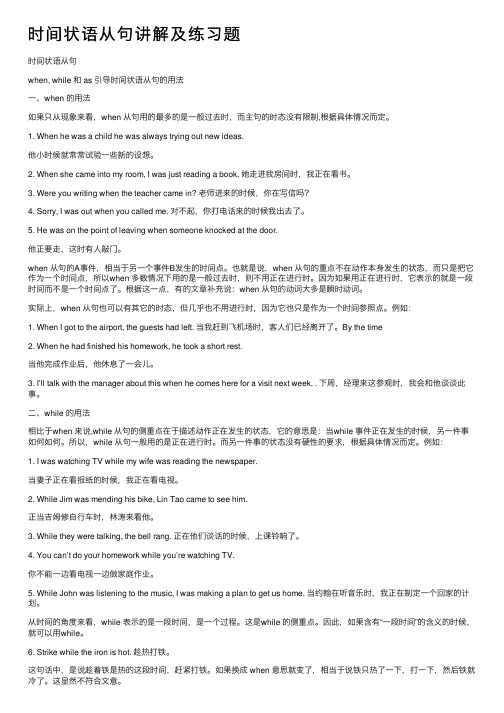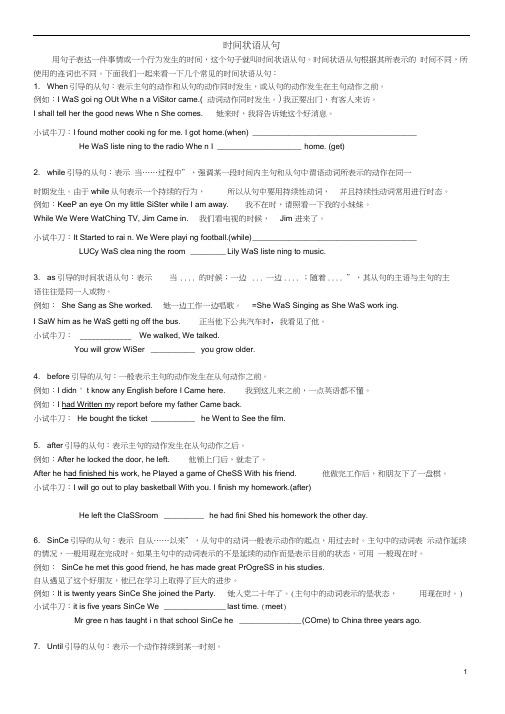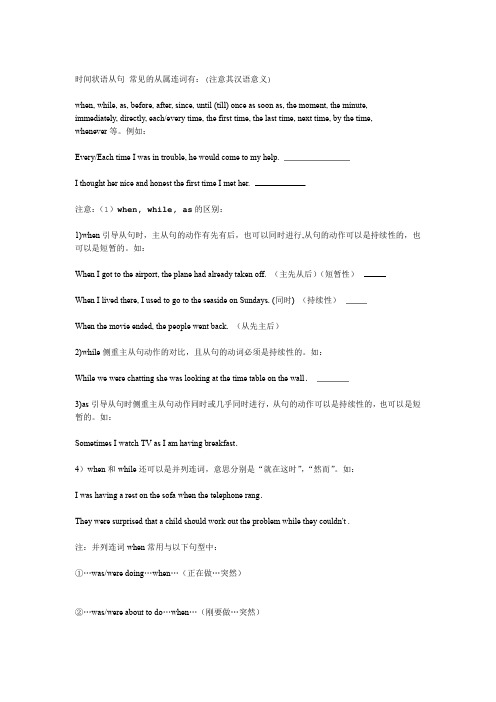时间状语从句及练习
时间状语从句讲解及练习题

时间状语从句讲解及练习题时间状语从句when, while 和 as 引导时间状语从句的⽤法⼀、when 的⽤法如果只从现象来看,when 从句⽤的最多的是⼀般过去时,⽽主句的时态没有限制,根据具体情况⽽定。
1. When he was a child he was always trying out new ideas.他⼩时候就常常试验⼀些新的设想。
2. When she came into my room, I was just reading a book. 她⾛进我房间时,我正在看书。
3. Were you writing when the teacher came in? ⽼师进来的时候,你在写信吗?4. Sorry, I was out when you called me. 对不起,你打电话来的时候我出去了。
5. He was on the point of leaving when someone knocked at the door.他正要⾛,这时有⼈敲门。
when 从句的A事件,相当于另⼀个事件B发⽣的时间点。
也就是说,when 从句的重点不在动作本⾝发⽣的状态,⽽只是把它作为⼀个时间点,所以when 多数情况下⽤的是⼀般过去时,则不⽤正在进⾏时。
因为如果⽤正在进⾏时,它表⽰的就是⼀段时间⽽不是⼀个时间点了。
根据这⼀点,有的⽂章补充说:when 从句的动词⼤多是瞬时动词。
实际上,when 从句也可以有其它的时态,但⼏乎也不⽤进⾏时,因为它也只是作为⼀个时间参照点。
例如:1. When I got to the airport, the guests had left. 当我赶到飞机场时,客⼈们已经离开了。
By the time2. When he had finished his homework, he took a short rest.当他完成作业后,他休息了⼀会⼉。
根据英语时间状语从句讲解及练习(简化版)

根据英语时间状语从句讲解及练习(简化版)一、什么是时间状语从句时间状语从句是由连词引导的从句,用来表示一个动作或状态发生的时间,它可以在句子中充当状语,起到修饰或限定其他句子成分的作用。
二、几种常见的时间状语从句及用法1. when当...时候例句:He was studying in the library when the earthquake happened.译文:地震发生时,他正在图书馆研究。
2. while当...的同时例句:I was cleaning the house while my sister was cooking.译文:我正在打扫房子,而我妹妹正在做饭。
3. as soon as一...就...例句:She called me as soon as she arrived home.译文:她一到家就给我打电话。
4. before在...之前例句:Please finish your homework before you go out to play. 译文:在你出去玩之前,请完成你的家庭作业。
5. after在...之后例句:He went to bed after he watched the movie.译文:他在看完电影之后上床睡觉。
6. until直到...例句:They played basketball until it got dark.译文:直到天黑之前他们都在打篮球。
三、时间状语从句练1. _______ he finishes his work, he will join us for dinner. (when)译文:当他完成工作时,他会加入我们共进晚餐。
2. I fell asleep _______ I was reading a book. (while)译文:我边看书边睡着了。
3. We will go shopping _______ the rain stops. (as soon as)译文:一雨停,我们会去购物。
时间状语从句讲解和练习(答案)

时间状语从句用句子表达一件事情或一个行为发生的时间,这个句子就叫时间状语从句。
时间状语从句根据其所表示的时间不同,所使用的连词也不同。
下面我们一起来看一下几个常见的时间状语从句:1. When引导的从句:表示主句的动作和从句的动作同时发生,或从句的动作发生在主句动作之前。
例如:I WaS goi ng OUt Whe n a ViSitor came.( 动词动作同时发生。
)我正要出门,有客人来访。
I shall tell her the good news Whe n She comes. 她来时,我将告诉她这个好消息。
小试牛刀:I found mother cooki ng for me. I got home.(when) _____________________________________ He WaS liste ning to the radio Whe n I ___________________ home. (get)2. while引导的从句:表示当……过程中”,强调某一段时间内主句和从句中谓语动词所表示的动作在同一时期发生。
由于while从句表示一个持续的行为,所以从句中要用持续性动词,并且持续性动词常用进行时态。
例如:KeeP an eye On my little SiSter while I am away. 我不在时,请照看一下我的小妹妹。
While We Were WatChing TV, Jim Came in. 我们看电视的时候,Jim 进来了。
小试牛刀:It Started to rai n. We Were playi ng football.(while) _____________________________________ LUCy WaS clea ning the room ________ Lily WaS liste ning to music.3. as引导的时间状语从句:表示当.... 的时候;一边... 一边.... ;随着.... ”,其从句的主语与主句的主语往往是同一人或物。
时间状语从句(含练习及答案)

以when 引导的时间状语从句- When I got home, my son had finished his homework. (主句动作发生在从句之前)- When(当...时候, 主语+did) we arrived, it was raining.- When(正当...时候,主语+be+doing) I was playing the computer games, my mum came in. - He is always nervous when he speaks to strangers.- I usually walk to school when it rains.以while 引导的时间状语从句- While I was reading, my brother was playing with his toy cars. (主从句子动作同时发生)- While/When/As he was studying in the library, I saw him. (表示一段时间时,while/when/as 可替换)while引导的从句的谓语动词必须是持续性动作:I saw him while(x) I was getting off the bus.(x)I saw him when/as I was getting off the bus.以as 引导的时间状语从句- He will grow wiser as he grows older. 随着年龄的增长,他会聪明起来。
(随着,表示时间的推移,这时,不用when/while)- He entered the room as/when/while the meeting was going on. 正当开会的时候,他走进房间。
以before引导的时间状语从句- He had washed his hands before he had dinner. (主句动作先于从句动作)- Please clean the house before you move in.以after 引导的时间状语从句- She went on holiday after she had taken the examination. (从句动作先于主句)- You can watch TV after you finish your homework.以since 引导的时间状语从句- She has been in the house since she came to the city. (主句完成时态,从句过去时)- I have taught them English since last year.以as soon as引导的时间状语从句- I will write to you as soon as I get to America. 我一到美国就会给你写信。
初中时间状语从句语法及练习

初中时间状语从句语法及练习英语时间状语从句讲解与练习(一)when, while 和as 引导时间状语从句的用法一、when 的用法如果只从现象来看,when 从句用的最多的是一般过去时,而主句的时态没有限制,根据具体情况而定。
1. When he was a child he was always trying out new ideas.他小时候就常常试验一些新的设想。
2. When she came into my room, I was just reading a book. 她走进我房间时,我正在看书。
3. Were you writing when the teacher came in? 老师进来的时候,你在写信吗?4. Sorry, I was out when you called me. 对不起,你打电话来的时候我出去了。
5. He was on the point of leaving when someone knocked at the door.他正要走,这时有人敲门。
6. I thought of it just when you opened your mouth. 就在你要说话的时候,我也想到了。
7. I had hardly[scarcely] closed my eyes when someone knocked at the door.我刚一闭上眼,就有人在敲门了。
根据以上的例句,我们可以总结出一点:when 从句的A事件,相当于另一个事件B发生的时间点。
也就是说,when 从句的重点不在动作本身发生的状态,而只是把它作为一个时间点,所以when 多数情况下用的是一般过去时,则不用正在进行时。
因为如果用正在进行时,它表示的就是一段时间而不是一个时间点了。
根据这一点,有的文章补充说:when 从句的动词大多是瞬时动词。
这种说法也可以参照。
实际上,when 从句也可以有其它的时态,但几乎也不用进行时,因为它也只是作为一个时间参照点。
完整word版高中时间状语从句及练习

时间状语从句常见的从属连词有:(注意其汉语意义)when, while, as, before, after, since, until (till) once as soon as, the moment, the minute, immediately, directly, each/every time, the first time, the last time, next time, by the time,whenever等。
例如:Every/Each time I was in trouble, he would come to my help.I thought her nice and honest the first time I met her.注意:(1)when, while, as的区别:1)when引导从句时,主从句的动作有先有后,也可以同时进行,从句的动作可以是持续性的,也可以是短暂的。
如:When I got to the airport, the plane had already taken off. (主先从后)(短暂性)When I lived there, I used to go to the seaside on Sundays. (同时) (持续性)When the movie ended, the people went back. (从先主后)2)while侧重主从句动作的对比,且从句的动词必须是持续性的。
如:While we were chatting she was looking at the time table on the wall.3)as引导从句时侧重主从句动作同时或几乎同时进行,从句的动作可以是持续性的,也可以是短暂的。
如:Sometimes I watch TV as I am having breakfast.4)when和while还可以是并列连词,意思分别是“就在这时”,“然而”。
高中时间状语从句及练习(含答案)

状语从句状语从句在句中作状语,修饰主句中的动词、形容词或副词等。
状语从句放在主句之前时,常用逗号分开;放在主句之后,一般不用逗号。
状语从句按其意义和作用可分为时间、原因、地点、条件、让步、目的、结果、方式、比较等9种。
1.时间状语从句时间状语从句表示主句动作发生的时间,主要由when,while,as ; before, after; till (until); once, by the time, as soon as, no sooner ... than和hardly ... when及名词词组the moment等引导。
1) when“在……的时候”; while “在……期间”; as “正当……的时候”when意为“在……的时候”,强调“特定时间”。
When spring came, he felt like a trip.When he was eating his breakfast, he heard the doorbell ring.说明:连词when在状语从句中还有如下几种含义:①表示突然发生的事,含义为“(正在……时)忽然”。
I was just coming along to see you when I ran into Wilson.I had been working a couple of months when I had a letter from Jane.②表示过早发生某事,意为“(还没……)就”。
此含义有时可用before代替。
I hadn’t been reading for half an hour when I heard steps outside.我刚读了不到半个小时就听到外面有脚步声。
I had been there little more than a week when I set to work in earnest.③表示“在……的情况下”,常可译为“虽然”,“既然”,“如果”。
时间状语从句及其练习题

状语从句一、时间状语从句一、时间状语从句 1、 as soon as “一、、、、、、就、、、、、、”引导时间状语从句的连词有引导时间状语从句的连词有The moment immediately The minute directly He instant instantly No sooner than Hardly had sb , done done…… when ….did ….. Scarcely when The moment she comes, I’I’ll call you. ll call you. She left immediately the meeting was over. Hardly had he got off the bus when he heard a loud noise. 2、 when ,while , as 引导时间状语从句引导时间状语从句时间点时间点 段时间段时间 区 别 When 主从同时;先后主从同时;先后 While 主从同时主从同时 对比对比 As 主从同时主从同时(一边、、、一边)、一边)It was raining when we arrived. My mother came in when I was doing my homework. While /when I was doing my homework, my mother came in. I am safe while I am here. He hurried home, looking behind as he went. As I left the house, I forgot the key. 主从句时态主从句时态Will you please bring me your book when you come here tomorrow? I will go home when I have finished my work . When / while 连词引导并列句连词引导并列句Was/ were about to do …Was /were going to do …. Was/were on one ’s way …Was .were on the point of doing …. When …. Was/were doing Was/were doing……. (“这时” 表同时) Had done …Jasmine was holidaying holidaying with with with her her her family family family in in in a wildlife a wildlife park when she w as was was bitten bitten bitten on on on the the the leg leg leg by by by a a lion. ………….while .while ………….(.(“然而”“然而” 表反比) I do every single bit of housework while my husband Bob just does the dishes now and then. 3、before 引导时间状语从句引导时间状语从句1)“还没等”(谓语不用否定式)(谓语不用否定式)Before they got to the bus stop, the bus had gone. 2) “….. (之后)才/就”It was evening before we reached the little town of Winchester. 3)固定句型:固定句型: It will (not) be some time before …………do do …… It was (not) some time before ….did ….. It won ’t be long before …………dodo do............ It wasn ’t long before (i)did did…….. 4 . until /till ( till 不用于句首或强调句)不用于句首或强调句) 引导时间状语从句引导时间状语从句1)…..not ….until/till .until/till……直到……才 He didn ’t go to bed until he had finished his work 2) …...until …...until /till /till …..直到……为止为止We were told that we should follow the main road until we reached the railway station . 3)强调句式强调句式It is not until …that … It was not until midnight that he went back home after the experiment. 4) not until 放在句首时,主句半倒装。
- 1、下载文档前请自行甄别文档内容的完整性,平台不提供额外的编辑、内容补充、找答案等附加服务。
- 2、"仅部分预览"的文档,不可在线预览部分如存在完整性等问题,可反馈申请退款(可完整预览的文档不适用该条件!)。
- 3、如文档侵犯您的权益,请联系客服反馈,我们会尽快为您处理(人工客服工作时间:9:00-18:30)。
时间状语从句常见的从属连词有:(注意其汉语意义)when, while, as, before, after, since, until (till) once as soon as, the moment, the minute, immediately, directly, each/every time, the first time, the last time, next time, by the time, whenever等。
例如:Every/Each time I was in trouble, he would come to my help.I thought her nice and honest the first time I met her.注意:(1)when, while, as的区别:1)when引导从句时,主从句的动作有先有后,也可以同时进行,从句的动作可以是持续性的,也可以是短暂的。
如:When I got to the airport, the plane had already taken off. (主先从后)(短暂性)When I lived there, I used to go to the seaside on Sundays. (同时) (持续性)When the movie ended, the people went back. (从先主后)2)while侧重主从句动作的对比,且从句的动词必须是持续性的。
如:While we were chatting she was looking at the time table on the wall.3)as引导从句时侧重主从句动作同时或几乎同时进行,从句的动作可以是持续性的,也可以是短暂的。
如:Sometimes I watch TV as I am having breakfast.4)when和while还可以是并列连词,意思分别是“就在这时”,“然而”。
如:I was having a rest on the sofa when the telephone rang.They were surprised that a child should work out the problem while they couldn’t .注:并列连词when常用与以下句型中:①…was/were doing…when…(正在做…突然)②…was/were about to do…when…(刚要做…突然)③…was/were on the point of doing…when…(刚要做…突然)④…had just done…when….(刚一…就)⑤Hardly/Scarcely had…done…when…(刚一…就)(2)before引导从句时,词义非常灵活,注意下列句子中的before的词义:1.Before I could get in a word, the tailor had measured me.(还没来得及…就)2.We hadn’t run a mile before he felt tired.(还没…就)3.We had sailed 4 days before we saw land.(…才…)4.Please write it down before you forget it.(趁还…没就)(3)till (until) 和not…till (until)1)till (until):主句谓语动词必须是持续性的,意思是“到…为止“如:He remained there till/until she arrived.2)not…till (until)…: 主句谓语动词必须是短暂性的,意思是“直到…才”如:She won’t go to bed till/until he returns home.3)not…until还有强调式和倒装式:强调句:It is not until he returns home that she will go to bed.倒装句:Not until he returns home will she go to bed.(4)几个极易混淆的时间状语从句:1)It was +时间点+when…(当的时候时间是)It was 5 am when we arrived at the village.2)It was/will be+时间段+before…(没过…就/过了…才)It was/will be two weeks before we met/meet again.3)It is /has been +时间段+since…(自从…以来有…)It is/has been 3 years since we last met.突破点:一看be动词的时态,二看时间段还是时间点。
注意:在“It is /has been +时间段+since…”句型中,从句的动词必须是短暂性的,如果是延续性的动词,时间要从从句的动作结束时算起。
如:It is 3 years since I smoked.( 我戒烟有三年了)补充:as soon as, immediately, directly, instantly, the moment, the minute, the instant, no sooner…than…, hardly/scarcely….when….和once这些从属连接词引导的从句都表示从句的动作一发生,主句的动作随即就发生,常译为“一…就…”。
从句中一般时态代替将来时态。
every time, each time, next time, the first time, any time, all the time等名词短语用来引导时间状语从句,表示“每当…..,每次…..;下次……”等。
练习题1. It was quiet ________ those big trucks started coming through the town.A. beforeB. afterC. untilD. unless2. It seemed only seconds ________ the boy finished washing his face.A. whenB. beforeC. afterD. even if3. Hardly had he reached the school gate ________ the bell rang.A. whileB. whenC. asD. as soon as4.We were told that we should follow the main road _____ we reached the central railway station.A. wheneverB. untilC. whileD. wherever5. I recognized you ________ I saw you at the airport.A. the momentB. whileC. afterD. once6. He was about to go to bed ________ the doorbell rang.A. whileB. asC. beforeD. when7.________I listen to your advice, I get into trouble.A. Every timeB. WhenC. WhileD. Until8. _____ John was watching TV, his wife was cooking.A. AsB. As soon asC. WhileD. Till9. The children ran away from the orchard(果园) ______ they saw the guard.A. the momentB. afterC. beforeD. as10. No sooner had I arrived home _____ it began to rain.A. whenB. whileC. asD. than11. Several weeks had gone by _____ I realized the painting was missing.A. asB. beforeC. sinceD. when12. It _____ long before we ____ the result of the experiment.A. will not be; will knowB. is; will knowC. will not be ; knowD. is; know13. –What was the party like?--Wonderful. It’s years _____ I enjoyed myself so much.A. afterB. beforeC. whenD. since14. The new secretary is supposed to report to the manager as soon as she_____.A. will arriveB. arrivesC. is going to arriveD. is arriving15. _____ got into the room _____ the telephone rang.A. He hardly had; thenB. Hardly had he; whenC. He had not; thenD. Not had he; when16. No sooner had he finished his talk _____ he was surrounded by the workers.A. asB. thenC. thanD. when17. –Did you remember to give Mary the money you owed her?--Yes, I gave it to her _____ I saw her.A. whileB. the momentC. suddenlyD. once18. I thought her nice and honest _____ I met her.A. first timeB. for the first timeC. the first timeD. by the first time19. He will have learned English for eight years by the time he _____ from the university next year.A. will graduateB. will have graduatedC. graduatesD. is to graduate20. The moment the 28th Olympic Games _____ open, the whole world cheered.A. declaredB. have been declaredC. have declaredD. were declared答案:CBBBA DACAD BCDBB CBCCD二、地点状语从句1.引导地点状语从句的从属连词where, wherever指具体地点时,从句可用于主句之前或之后;表示抽象条件的含义时,从句须放在主句之前。
